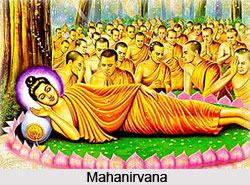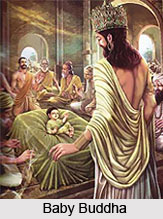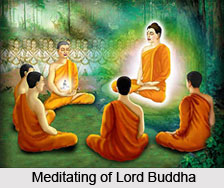 Legends surrounding Gautama Buddha`s enlightenment stage state that after leaving his palatial home and comfortable existence within a princely lifestyle, for six years Buddha performed everything that anybody could do to search for truth. He went to all kinds of teachers, masters, scholars, wise men, sages and saints. But after six years` tremendous effort, austerities, fasting, and yoga postures, nothing had happened. He had tried for six years continuously with different masters to find the truth, but nothing culminated to something fruitful. He was in great despair because he had been with all the great teachers that were available. Those teachers themselves had to say to him, "Whatever we knew we have taught to you. If you want more, then you will have to find it for yourself. This is all that we know. And we understand perfectly that you are not satisfied; neither are we satisfied, but we are not so courageous to go on trying to find. Even if it takes lives, go on trying to find it."
Legends surrounding Gautama Buddha`s enlightenment stage state that after leaving his palatial home and comfortable existence within a princely lifestyle, for six years Buddha performed everything that anybody could do to search for truth. He went to all kinds of teachers, masters, scholars, wise men, sages and saints. But after six years` tremendous effort, austerities, fasting, and yoga postures, nothing had happened. He had tried for six years continuously with different masters to find the truth, but nothing culminated to something fruitful. He was in great despair because he had been with all the great teachers that were available. Those teachers themselves had to say to him, "Whatever we knew we have taught to you. If you want more, then you will have to find it for yourself. This is all that we know. And we understand perfectly that you are not satisfied; neither are we satisfied, but we are not so courageous to go on trying to find. Even if it takes lives, go on trying to find it."
Finally, in order to seek nirvana, enlightenment and the truth, Buddha had to drop all the teachers and masters to embark on his own. He worked tremendously hard. In another incident of legends surrounding Buddha`s enlightenment, One day Buddha was staying by the side of Niranjana River. He went down into the river to take a bath; but he had been fasting too long. Buddha was so weak and the river current was so fast and strong that he was almost swept down the river. Somehow he caught hold of the roots of a tree and in that moment an idea came to him: "I have become so weak by fasting because all the teachers, all the scriptures, constantly insist that unless you purify yourself by fasting, you cannot attain enlightenment. I have weakened myself so much, but enlightenment has not happened. I cannot even get out of this small Niranjana River. How am I supposed to get out of the ocean of the whole world?" Buddha sensed danger because if he could not even cross the Niranjana River, he could never cross bhavsagar, the ocean of the world. It was a great moment of insight. Buddha comprehended that he had been unnecessarily torturing his body till then. He grasped that it was not purification, it was weakening himself. It did not make him spiritual; it has made him sick.
Meanwhile, as time progressed in stages to Buddha`s nirvana, legends surrounding his enlightenment arrived to a certain woman in the town who had made a promise to the tree under which Gautam Buddha was staying. Her promise was that if her son recovered from sickness, she would come on the full-moon night and bring a bowl of sweets in gratitude to the deity of the tree. It was a full-moon night, and by mere coincidence Buddha was sitting under the tree. The woman exclaimed in thought that the deity Himself was sitting under the tree waiting for her; she was overjoyed. She placed the sweets at his feet and expressed that she had never heard of the deity Himself coming out of the tree and accepting the offering of poor people. However, she felt that Buddha was great and had helped her enormously. She begged forgiveness for giving the Gautama so much trouble and earnestly appealed Him to accept her humble offering. Buddha ate for the first time in years without suffering any guilt.
 Stories abound and continue about various legends that surrounded Gautama Buddha`s stage of enlightenment. On one such occasion, One day Buddha was walking with a disciple where He had gathered a few disciples even before he became enlightened. A light had started spreading, like in the times of dawn. Before Buddha was yet to turn enlightened, he had five disciples under him. He was taking a walk with those five disciples. Then a fly had sat on his head. He was talking to the disciples and without paying much attention, mechanically, he moved his hand and the fly flew away. Then he stopped and closed his eyes. The disciples could not understand what was happening, but they all became silent. They apprehended that something precious was happening. Buddha`s face turned luminous and he raised his hand slowly and again moved it near his forehead as if the fly were still sitting there. However, it was not there anymore. The disciples asked, "What are you doing? The fly is no longer there." Buddha replied, "But now I am moving my hand consciously-that time I did it unconsciously. I missed an opportunity of being conscious. I was too much engaged in talking with you and the hand simply moved mechanically. It should have moved consciously. Now I am moving it as it should have moved." This is what Buddha meant when he talked about the path of virtue: to become so alert that even small acts, small gestures, movements, all become full of awareness.
Stories abound and continue about various legends that surrounded Gautama Buddha`s stage of enlightenment. On one such occasion, One day Buddha was walking with a disciple where He had gathered a few disciples even before he became enlightened. A light had started spreading, like in the times of dawn. Before Buddha was yet to turn enlightened, he had five disciples under him. He was taking a walk with those five disciples. Then a fly had sat on his head. He was talking to the disciples and without paying much attention, mechanically, he moved his hand and the fly flew away. Then he stopped and closed his eyes. The disciples could not understand what was happening, but they all became silent. They apprehended that something precious was happening. Buddha`s face turned luminous and he raised his hand slowly and again moved it near his forehead as if the fly were still sitting there. However, it was not there anymore. The disciples asked, "What are you doing? The fly is no longer there." Buddha replied, "But now I am moving my hand consciously-that time I did it unconsciously. I missed an opportunity of being conscious. I was too much engaged in talking with you and the hand simply moved mechanically. It should have moved consciously. Now I am moving it as it should have moved." This is what Buddha meant when he talked about the path of virtue: to become so alert that even small acts, small gestures, movements, all become full of awareness.
A remarkable legend surrounding Gautama`s stage of enlightenment was his respect for his family even after a period of twelve years. When he was enlightened, the first thing he wanted to do was to go back to his palace apologise to his father, to his wife, to his son had grown up. He was aware that they would be annoyed. Buddha`s father was extremely furious, he was the first one to meet him and for half an hour continued abusing Buddha. But then suddenly he became aware that he was shouting countless things to which his son was merely standing like a marble statue, as if nothing was affecting him. The father looked at him and Gautam Buddha replied that this was what he had wanted. Buddha requested him to dry his tears and look towards his son. Buddha continued that he was not the same boy who had left the palace. "Your son died long ago. I look similar to your son, but my whole consciousness is different. You just look." His father replied that he could very well perceive it. For half an hour he had been abusing his son and that was enough proof that he had transformed. Otherwise, Buddha`s father was aware how temperamental his son was, who could not stand so silently. He lastly enquired what had happened to him. Buddha however, expressed his wish to see his wife and child, who must have been waiting since his arrival to the palace.
The first thing his wife said to him was, "I can see that you are transformed. These twelve years were a great suffering, but not because you had gone; I suffered because you did not tell me. If you had simply told me that you were going to seek the truth, do you think I would have prevented you? You have insulted me very badly. This is the wound that I have been carrying for twelve years." Yashodhara, Buddha`s wife continued to pour out her suppressed feelings that she too belonged from the warrior caste. She concluded her saying by uttering that she was not weak enough to cry and scream when she heard that her husband was renouncing the world in search of truth. On the contrary, she would have given him a send-off by coming up to the chariot to bid goodbye. Adding up to the legends surrounding Gautama`s enlightenment, Yashodhara placed her question that she had meant to ask for the past twelve years. The question was well-placed. She expressed that whatever Buddha had attained and it certainly seemed he had attained something, because her husband no longer looked the same person who left the palace. He was radiating a different light, his presence was totally new and fresh, his eyes were as pure and clear as a cloudless sky. He had turned so beautiful did not seems to be from the earthly world. Some grace from the beyond had descended on her husband. She then placed her question, "Whatever you have attained, was it not possible to attain it here in this palace? Can the palace prevent the truth?"
 It was a tremendously intelligent question and Gautam Buddha had to agree. He replied, "I could have attained it here, but I had no idea at that moment. Now I can say that I could have attained it here in this palace; there was no need to go to the mountains, there was no need to go anywhere. I had to go inside, and that could have happened anywhere. This palace was as good as any other place, but only now I can say it. At that moment I had no idea. Hence, Buddha asked for forgiveness, because it was never that he did not trust his wife`s courage. In fact, legends surrounding Gautama`s enlightenment also speak that Buddha was doubtful of himself.
It was a tremendously intelligent question and Gautam Buddha had to agree. He replied, "I could have attained it here, but I had no idea at that moment. Now I can say that I could have attained it here in this palace; there was no need to go to the mountains, there was no need to go anywhere. I had to go inside, and that could have happened anywhere. This palace was as good as any other place, but only now I can say it. At that moment I had no idea. Hence, Buddha asked for forgiveness, because it was never that he did not trust his wife`s courage. In fact, legends surrounding Gautama`s enlightenment also speak that Buddha was doubtful of himself.
Legends surrounding Gautam Buddha`s enlightenment and later stages state that he had remained silent for seven days after he had attained nirvana. All of existence waited breathlessly to hear him, to hear his music, to hear his soundless song, his words coming from the land of the beyond. All of existence was waiting and those seven days seemed like seven centuries. The Gods in heaven even became worried. The Gods became disturbed when seven days of silence had passed after Gautam Buddha`s enlightenment. And it was a fact of rare excellence because it seldom happened that a human being became enlightened. The Gods descended, touched the feet of Gautama Buddha and urged him to speak: "Existence is waiting. The trees are waiting, the mountains are waiting, the valleys are waiting. The clouds are waiting, the stars are waiting. Don`t frustrate everyone. Don`t be so unkind, have some mercy and speak." But Gautama had his own argument. He replied that he could very well apprehend the Gods` compassion and he would like to speak. Buddha continued that for seven days he had been wavering between the two, whether to speak or not to speak and every argument went for not speaking. He was sure that he was going to be misunderstood, to be condemned by society.
To add further to the list of legends surrounding Gautama`s enlightenment, there goes even one more retelling. Once, Buddha was surrounded by a crowd that was maltreating him, using ugly and obscene words. The reason behind such act was Buddha`s complete rejection of organised religion of Hinduism and Hindu holy scriptures, the Vedas. He had condemned priesthood, stating that they were exploiters, parasites. The Brahmans, quite obviously were enraged. This was a Brahman village through which Gautama was passing and the Brahmans beleaguered him and uttered every kind of bad lyric that they could manage. He listened silently. Buddha`s disciples turned angry, but because he was present it was not courteous to say anything. Finally Buddha said to them, "If the things that you wanted to say to me are finished, I would like to go on to the next village where
people are waiting for me. But if you are not finished, after a few days I will be returning and I will inform you. Then I will have enough time to listen to all that you want to say."
One man however shouted and denied that they were saying anything to him, but they were plainly condemning him. The statement that Buddha made to these village people is greatly significant. He said, "You have come a little too late. If you had come ten years ago when I was as insane as you are, not a single person would have left here alive." Ten years ago Buddha was a prince, a warrior, one of the best archers of his time, a great swordsman. Buddha continued in his speech that he was no longer insane and that he could not react. However, he had wished to ask one question. Legends surrounding Buddha`s enlightenment stage speak about a well-placed question, wherein Gautama had spoke about a last village where people came with sweets and fruits and flowers to receive him; however, they were in a habit to take food only once in the day and they had already eaten their food. Hence, Buddha and his disciples had to tell them,
 `You please forgive us, we cannot accept sweets, flowers. We accept your love, but these things you will have to keep.` Coming back to the present context, Buddha then asked the abusive men from the current village, "what must they have done with the sweets and flowers they had brought as presents for us?" One man replied that those men were sure to have distributed the sweets in the village. Buddha answered that the incident was making him extremely sad. "What will you do?-because I don`t accept what you have brought, in the same way I did not accept the sweets and the flowers and other things that the people brought to me in the other village. If I don`t accept your obscenity, your ugly words, your dirty words-if I don`t accept them, what can you do? What are you going to do with all this garbage that you have come with?" It had become quite apparent that they would not be able to take it back to their homes and give to their wives, children, or neighbours. Buddha concluded that they would have to distribute it, because he was refusing to accept it. They did not possess the capability to make Gautama angry unless he accepted their humiliation, their insult. Such was the supreme sublimity of Buddha.
`You please forgive us, we cannot accept sweets, flowers. We accept your love, but these things you will have to keep.` Coming back to the present context, Buddha then asked the abusive men from the current village, "what must they have done with the sweets and flowers they had brought as presents for us?" One man replied that those men were sure to have distributed the sweets in the village. Buddha answered that the incident was making him extremely sad. "What will you do?-because I don`t accept what you have brought, in the same way I did not accept the sweets and the flowers and other things that the people brought to me in the other village. If I don`t accept your obscenity, your ugly words, your dirty words-if I don`t accept them, what can you do? What are you going to do with all this garbage that you have come with?" It had become quite apparent that they would not be able to take it back to their homes and give to their wives, children, or neighbours. Buddha concluded that they would have to distribute it, because he was refusing to accept it. They did not possess the capability to make Gautama angry unless he accepted their humiliation, their insult. Such was the supreme sublimity of Buddha.



















